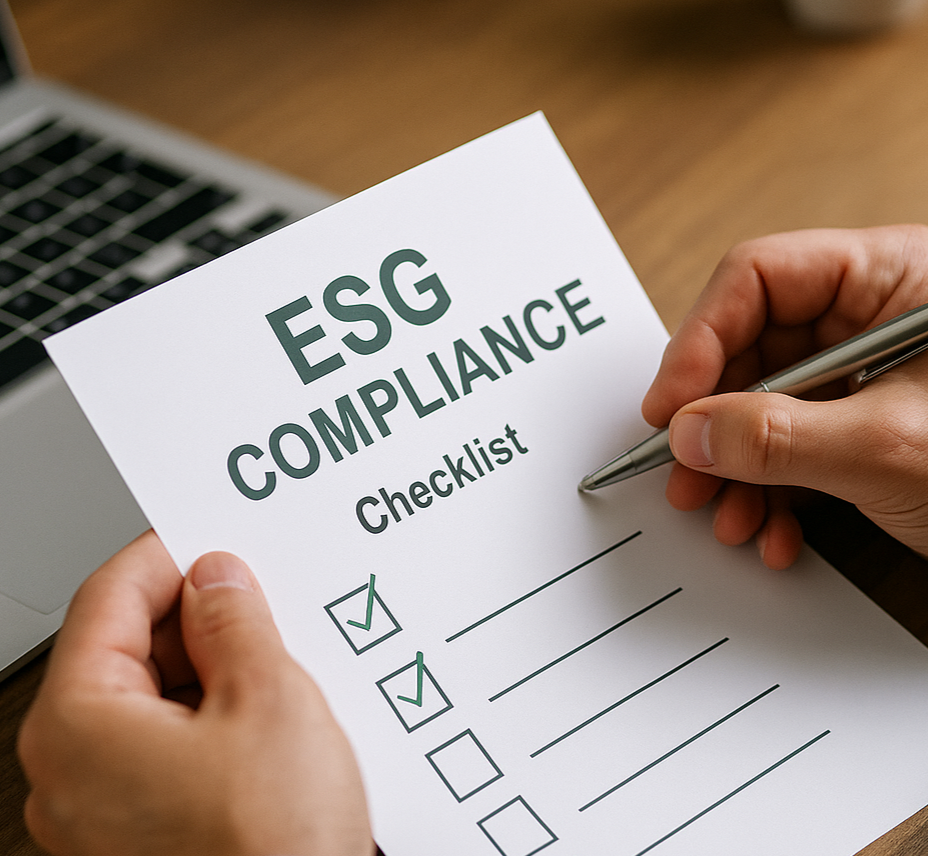
• Introduction: The ESG Surge Shaping Saudi Business
ESG compliance in Saudi Arabia is no longer optional—it’s a competitive advantage. As Vision 2030 accelerates environmental, social, and governance initiatives, Saudi businesses must adapt to meet rising investor expectations and regulatory scrutiny.
From the Capital Market Authority (CMA) to the Saudi Central Bank (SAMA), regulators are rolling out guidelines that require companies to integrate ESG principles into their core strategies. For business leaders, governance professionals, and compliance officers, this transformation demands immediate attention—and a long-term plan.
• What Is ESG Compliance and Why It Matters
ESG compliance means that a business aligns its operations with measurable environmental, social, and governance standards.
Think of it as upgrading your license to operate:
- Environmental: Reducing emissions, managing waste, using renewable resources
- Social: Protecting labor rights, engaging communities, promoting DEI
- Governance: Enforcing transparency, board accountability, and ethical leadership
Analogy: If corporate governance is the GPS, ESG is the map that shows you where the future is heading.
• ESG Compliance in the Saudi Context
Saudi Arabia is leading the regional ESG movement—and not just because it’s trendy.
- Vision 2030 makes sustainability central to national growth
- Public Investment Fund (PIF) demands ESG metrics for portfolio companies
- The CMA has issued ESG disclosure requirements for publicly listed firms
- Major companies like Aramco, SABIC, and STC have adopted ESG frameworks
Saudi regulators and investors alike expect companies to demonstrate long-term ESG performance—not just paper promises.
• Top ESG Compliance Challenges for Saudi Companies
Despite momentum, ESG implementation presents several barriers in the Kingdom:
- Unclear Regulatory Pathways: Businesses struggle to interpret evolving CMA and SAMA ESG rules
- Data Collection Gaps: Accurate environmental and social performance data is difficult to capture
- Limited Internal Expertise: Few organizations have dedicated ESG personnel or tools
- SME Budget Constraints: Smaller companies lack the funds for ESG audits and software
- Cultural Resistance: Some executives see ESG as a cost rather than a growth enabler.
• Solutions & Best Practices for ESG Compliance in KSA
Steps
| 1 |
| 2 |
| 3 |
| 4 |
| 5 |
| 6 |
Action
|
Understand local ESG laws |
|
Set measurable ESG KPIs |
|
Automate data collection |
|
Conduct regular audits |
|
Train staff continuously |
|
Report transparently |
CG BOD Support
| CMA-compliant regulatory updates |
| ESG KPI templates and scorecards |
| ESG module in CG BOD GRC software |
| Built-in audit workflow engine |
| LMS integration and custom checklists |
| ESG reporting and CMA submission tools |
Action
| Understand local ESG laws |
| Set measurable ESG KPIs |
| Automate data collection |
| Conduct regular audits |
| Train staff continuously |
| Report transparently |
CG BOD Support
| CMA-compliant regulatory updates |
| ESG KPI templates and scorecards |
| ESG module in CG BOD GRC software |
| Built-in audit workflow engine |
| LMS integration and custom checklists |
| ESG reporting and CMA submission tools |
• Real Saudi Examples: ESG in Action
SABIC: Adopted a data-driven ESG framework, cutting greenhouse gas emissions by 6% in two years and improving reporting transparency.
STC: Integrated ESG into its C-level KPIs, leading to improved investor relations and a stronger governance reputation.
Almarai: Used CG BOD’s software to streamline ESG audits, achieving faster compliance and higher stakeholder trust.
These organizations prove that ESG is not a burden—it’s a strategic investment.
• Conclusion
In conclusion, mastering ESG compliance in Saudi Arabia is no longer a future ambition—it is a present-day imperative. With the Kingdom’s regulatory bodies like CMA and SAMA tightening sustainability reporting standards in line with Vision 2030, businesses must proactively adapt or risk falling behind. By understanding core ESG principles, aligning with local frameworks, addressing key compliance challenges, and applying best practices tailored to the Saudi market, organizations can not only avoid regulatory pitfalls but also unlock new value, trust, and competitiveness. Whether you’re beginning your ESG journey or looking to optimize your reporting, CG BOD’s GRC platform provides a robust, Saudi-specific solution that makes ESG compliance smarter, faster, and scalable.
